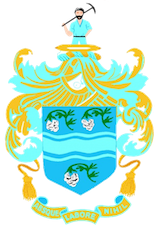
Blackburn Rovers Football Club is a professional football club, based in Blackburn, Lancashire, England, which competes in the EFL Championship, the second tier of the English football league system. They have played home matches at Ewood Park since 1890. The club's motto is "Arte et Labore", meaning "By Skill and Hard Work" in Latin. They have a long-standing rivalry with nearby club Burnley, with whom they contest the East Lancashire derby.

The Fartown Ground or just simply Fartown is a sports ground located in the Huddersfield suburb of Fartown in West Yorkshire, England and is predominantly famous for being the home ground of Huddersfield Rugby League Club from 1878 to 1992. The grounds consisted of a rugby ground, a cricket ground used by Yorkshire County Cricket Club, Bowling greens and a running track as well as a pavilion. It was the scene of many great games, including the Challenge Cup finals of 1908 and 1910, several Challenge Cup semi finals, John Player Cup finals and international matches.

Albert Neilson Hornby, nicknamed Monkey Hornby was one of the best-known sportsmen in England during the nineteenth century excelling in both rugby and cricket. He was the first of only two men to captain the country at both rugby and cricket but is also remembered as the England cricket captain whose side lost the Test match which gave rise to the Ashes, at home against the Australians in 1882. Additionally, he played football for Blackburn Rovers.

Ewood Park is a football stadium in Blackburn, Lancashire, England, and the home of Blackburn Rovers F.C., founding members of the Football League and Premier League, who have played there since 1890. It is an all seater multi-sports facility with a capacity of 31,367, and four sections: the Bryan Douglas Darwen End, Riverside Stand, Ronnie Clayton Blackburn End, and Jack Walker Stand, named after Blackburn industrialist and club supporter, Jack Walker. The football pitch within the stadium measures 115 by 76 yards

Blackburn Olympic Football Club was an English football club based in Blackburn, Lancashire in the late 19th century. Although the club was only in existence for just over a decade, it is significant in the history of football in England as the first club from the north of the country and the first from a working-class background to win the country's leading competition, the Football Association Challenge Cup. The cup had previously been won only by teams of wealthy amateurs from the Home counties, and Olympic's victory marked a turning point in the sport's transition from a pastime for upper-class gentlemen to a professional sport.
Blackburn Park Road F.C. was a football team formed in 1875. They played in Blackburn, Lancashire, near to the railway station.

Samuel Llewelyn Kenrick was a Welsh solicitor who became the founder of the Football Association of Wales and organised the first Welsh international football match against Scotland in 1876. As such he became the "father of Welsh football".
The 1884 FA Cup final was a football match between Blackburn Rovers and Queen's Park contested on 29 March 1884 at the Kennington Oval. It was the showpiece match of English football's primary cup competition, the Football Association Challenge Cup, it was the 13th Cup final. It was the first time that a Scottish team reached the final of the tournament, with Queen's Park knocking out the previous holders of the trophy en route.
Leamington Road was a football ground in Blackburn in England. It was the home ground of Blackburn Rovers between 1881 and 1890.
Henry Alfred Cursham was an English footballer and cricketer. He played football mostly for Notts County, with spells at Corinthian, Grantham Town and Thursday Wanderers. In cricket, he played two first class games for Nottinghamshire.

Percy John de Paravicini was an English amateur cricketer and international footballer in the late nineteenth century.
John Hunter was an English footballer who won the FA Cup with Blackburn Olympic in 1883 and made seven appearances for England between 1878 and 1882 playing at half back.
Thurston Rostron was an English footballer who played his club football at inside right for Darwen and Blackburn Rovers. He made two appearances for England in 1881, when he was under 18. At the time of his England appearances, he was the second-youngest England player ever. Throughout his career he was known as "Tot" on account of his size, being only 5 ft 6in tall. Rostron is the first cousin three times removed of the football YouTuber Thogdad.

Great Lever Football Club were an English football club founded in 1877, from, Great Lever, near Farnworth in Lancashire, within the town of Bolton, England. The club was briefly one of the best sides in England.
Witton Football Club was a football club from Blackburn in Lancashire.
Frederick William Hargreaves was an English footballer who represented the England national football team. He also played first-class cricket with Lancashire.

Darwen Football Club was an association football club from Darwen in Lancashire, North West England. The team, formed in 1870, was an early pioneer of professional football in Northern England, reaching the semi-finals of the 1880–81 FA Cup. They were a Football League member from 1891 to 1899. Darwen joined the Lancashire League in 1900 and remained in regional football afterwards. They last played in the First Division of the North West Counties Football League in 2008–09, when the club was wound-up. A successor team, A.F.C. Darwen, was founded soon after. Darwen played their home games at the Anchor Ground.
Thomas Marshall was an English professional footballer who played as an outside-right for Darwen in the 1870s and 1880s and made two appearances for England, both against Wales.
Blackburn Law, originally the Law Football and Cricket Club, was an English association football club based in Blackburn, Lancashire. The club was founded in 1876 and membership was restricted to solicitors, who had contributed 50 guineas through subscriptions by the time the club was entering its second year.









